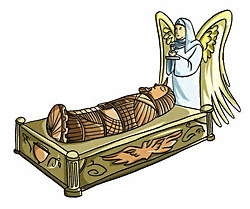phago-, phag-, -phage, -phagi, -phagic, -phagically, -phagia, -phagism, -phagist, -phagic, -phagous, -phagy
(Greek: eat, eating; to consume, to ingest; relationship to eating or consumption by ingestion or engulfing)
2. In medicine, it is defined as, The practice of swallowing food without thorough mastication (without thoroughly chewing it).
3. A related term, flecherism, promotes taking small amounts of food at a time and chewing each small quantity for a prolonged period before swallowing. Promoted by, and named for, Horace Fletcher, U.S. dietitian, 1849-1919.
2. A reference to a plant that obtains nourishment through its own roots.
2. Subsisting on decaying organic matter, saprotrophic.
3. Feeding on dead or decaying organic matter; biophagous.
2. From Greek, sarkophagos, through Latin, sarcophagus; so named because the limestone, in which people were buried, caused rapid disintegration or decomposition of the bodies.
3. Among the ancient Greeks and Romans, it was a limestone coffin or tomb, often inscribed and ornamented.
4. Now, by extension, the term is used for any stone coffin, especially a large or monumental tomb.

The ancient Greeks used, for the making of coffins, a limestone which disintegrated the flesh of bodies deposited in it within a few weeks.
Such a coffin was called sarkophagos, literally, "eating flesh," a word formed from sarx, "flesh," and phagein, "to eat." From this origin comes our word sarcophagus, which has lost its literal significance and denotes merely any stone coffin or large coffin placed where it may be seen.
Related "eat, eating" word units: brycho-; esculent-; esophago-; glutto-; vor-.
Cross references of word families that are related directly, or indirectly, to: "food, nutrition, nourishment": alimento-; broma-; carno-; cibo-; esculent-; sitio-; tropho-; Eating Crawling Snacks; Eating: Carnivorous-Plant "Pets"; Eating: Folivory or Leaf Eaters; Eating: Omnivorous.


